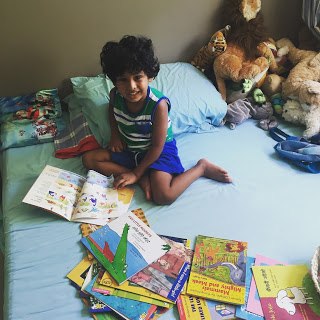Raising Readers With Multilingual Books

I have read extensively to my 4.5 year old. His vocabulary grew by leaps and bounds
from the age 2 to 4 thanks to the amount of chapter books we read starting young.
There were days when we’d spend 1.5 hours or more reading at times and we
welcomed holidays too!
I grew up as a child of a mixed language marriage. While that looks great on the
outside, the common tongue my parents had was English and my brother and I grew
up living in Mumbai but knowing only English fluently with bits of Hindi, Marathi
and Gujarathi thrown in for effect. I still feel that though Marathi is not my mother
tongue strictly speaking, my parental grandmother is the one person who un
wavering in her approach answered back in Marathi during every conversation and
I cannot help but remember her fondly every time I hear or speak it. Language is
that powerful!
My children are also products of a mixed language marriage where my husband is
South Indian and very fluent in his language, and I am Gujarathi / Marathi and fluent
in neither. As a result of which my kids only hear English around them and hindi is
spoken by the help, which they have picked up and can speak.
From very early on, my first son – now 4.5 – started to speak hindi to anyone who
waited on tables or drove cars. When we travelled to London when he was 20
months old I heard him switch to hindi when he spoke to anyone who was serving
us. That’s when my husband and I caught on that he thinks that English is what you
speak to some people and hindi to a certain set of others, compounding the very
elitist attitude that’s been prevalent in India for the past century, and definitely
something we did not want to propagate.
Therefore I set about buying bilingual books. I bought plenty of hindi / English and
Marathi / English books from Pratham Books and wow what a fabulous effect that
had. My son was so fascinated when I started reading in another language that he’d
just stay still and listen waiting on every word. At first he asked, why are you
reading in hindi mamma? Which gave me even more reason to persevere.
Today we have a enviable stack of bilingual books and we pick any of them at any
point fromm amongst hundreds of others as they are just regular books in the pile
and not because they are not in English. There is a normalcy in reading in another
language, a barrier that my spoken language has just not been able to cross.
Books can teach you things on such subtle levels, like language should not be a
barrier and that every language is cool and important. Its not my language, it’s not
your language and to celebrate that we must step out of our comfort zone at times
and read things in other languages.
expressing himself in hindi to everyone around and does not think that he has to
reserve it only for our help. I like to think that it has something to do with reading
bilingual books to him at a young age.
mother tongues as English has been the most easy to do. It’s something we need to
take up as a challenge and work on else it will be a real pity for them to lose out on
such an important aspect of their heritage.
your kids only in your mother tongue and are we being lazy parents in this aspect?









